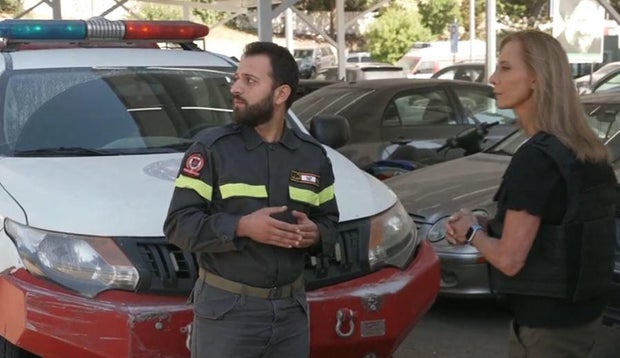A look at first responders in Lebanon amid strikes
Nabatiyeh, southern Lebanon — Israel's military said Tuesday that it had killed Hashem Safieddine, the head of Hezbollah's Executive Council who'd been seen as a possible next leader of the group, in an airstrike in Beirut's southern suburb of Dahiya three weeks ago. That was just days after the Israel Defense Forces killed the Iran-backed, U.S. and Israeli-designated terrorist group's long-time leader Hassan Nasrallah in a different airstrike in Lebanon.
Many of the group's leaders have been killed over the last month and a half, including three more commanders just this week, but the fighting still rages in Lebanon. The Lebanese health ministry says almost 2,000 people have been killed since Israel dramatically ramped up its assault on Hezbollah in mid-September.
There were more airstrikes on Beirut overnight, and with each one, teams of first responders jump into ambulances and head straight for the buildings reduced to rubble. CBS News met some of the medical workers who risk their own lives to save people in the war zone.
While rushing into danger is second nature to them, Hussein Fakih, who leads the rescue team in the southern town of Nabatiyeh, less than 10 miles from the Israeli border, claims he and his fellow medics are being deliberately targeted by Israeli forces. He was seriously wounded by an Israeli missile that struck next to their base.
 Hussein Fakih, who leads the Lebanese Civil Defense rescue team in the southern town of Nabatiyeh, is seen in a file photo at the scene of an Israeli airstrike.
Courtesy of Nussein Fakih/Lebanese Civil Defense
Hussein Fakih, who leads the Lebanese Civil Defense rescue team in the southern town of Nabatiyeh, is seen in a file photo at the scene of an Israeli airstrike.
Courtesy of Nussein Fakih/Lebanese Civil Defense
He said that for months after Oct. 8, 2023, when Israel started bombing Hezbollah targets in response to the group's incessant rocket and drone launches against Israel — more than 13,000 over the last year, according to the IDF — his team did not feel directly threatened. But Fakih said that changed more recently, and the IDF "started targeting directly the places the teams are working. More than once."
"Our vehicles are clearly marked with the internationally recognized symbols for rescue workers," he said it seems to provide no protection.
Fakih's nephew Hussein Jaber is also a first responder. Seeing so much death up close has been tough for him, and harder still when it was one of his own.
The "worst day," he said, was just last week, when an Israeli strike hit next to their base, wounding his colleague Naji Fahs.
"He was married and had two children. Was about 50 years old," said Jaber. "He was a few meters away from me. Unfortunately, he was wounded in an airstrike that was right next to our station and he died. May he rest in peace."
Fakih told CBS News that eight members of his team had been killed and 35 wounded over the last month alone, "plus 90% of our equipment was hit and was broken."
"Our job is to help people," Jaber said. "To keep them safe… Our colleagues died and our friends are wounded, and we were wounded, too, but we will continue to help the people and protect their livelihoods. In fact, this gives us greater incentive to continue our humanitarian mission."
 Lebanese Civil Defense first responder Hussein Jaber and CBS News correspondent Debora Patta react to the sound of an Israeli airstrike nearby as they speak in Nabatiyeh, southern Lebanon, in late October 2024.
CBS News
Lebanese Civil Defense first responder Hussein Jaber and CBS News correspondent Debora Patta react to the sound of an Israeli airstrike nearby as they speak in Nabatiyeh, southern Lebanon, in late October 2024.
CBS News
As CBS News finished interviewing Jaber, there was a strike nearby. Duty called, and just like that, Jaber was off.
Two hours later, he raced to yet another emergency scene.
"Anyone there?" he called out into the pile of rubble. He and his colleagues pulled 12 bodies from the rubble.
Shortly after carrying out that grim work, Jaber was wounded in another Israeli strike.
 Lebanese Civil Defense team member Hussein Jaber is treated for injuries sustained in an Israeli airstrike near Nabatiyeh, southern Lebanon, in late October 2024.
CBS News
Lebanese Civil Defense team member Hussein Jaber is treated for injuries sustained in an Israeli airstrike near Nabatiyeh, southern Lebanon, in late October 2024.
CBS News
His injuries were minor, and the team is so short-staffed that he went straight back to work.
According to United Nations humanitarian agencies, at least 87 health care workers had been killed in the country as of Oct. 10, and ambulances and relief centers had been "targeted or hit in Lebanon, causing further casualties." According to CBS News' own count, that death toll has risen to at least 120.
CBS News asked the IDF about the civil defense teams' claims that they're being directly targeted. In a statement, the military said it "operates in strict accordance with international law. It must be emphasized, however, that Hezbollah unlawfully embeds its military assets into densely populated civilian areas, and cynically exploits civilian infrastructure for terror purposes."
The IDF said, as it has many times about its operations in both Lebanon and the Gaza Strip, that it makes "all feasible efforts to mitigate harm to civilians during operational activity," including by giving "advanced warnings to civilians in Lebanon where Hezbollah embedded its military assets and weapons."
While the IDF does often issue evacuation orders ahead of strikes, Lebanese rescuers and civilians have told CBS News that such warnings are not always issued before missiles slam into residential areas.
Tucker Reals contributed to this report.

 By CBS (World News) | Created at 2024-10-23 10:25:45 | Updated at 2024-10-23 12:20:05
1 hour ago
By CBS (World News) | Created at 2024-10-23 10:25:45 | Updated at 2024-10-23 12:20:05
1 hour ago




